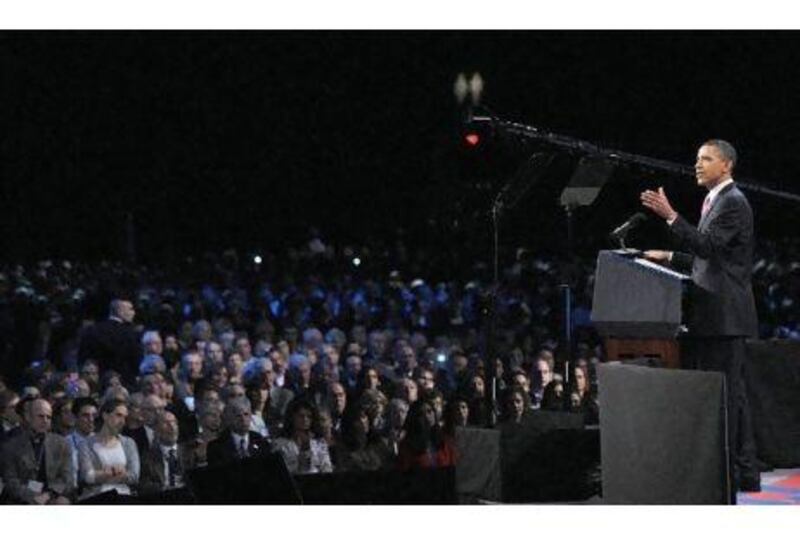WASHINGTON // Barack Obama, the US president, used an address yesterday to a powerful pro-Israel lobbying organisation to reiterate the position he staked out on Thursday regarding the future borders of a Palestinian state, a position that has proven deeply controversial among American supporters of Israel.
"If there is a controversy, then, it's not based in substance," Mr Obama told the thousands in attendance at the opening day of the 2011 policy conference of the American Israel Public Affairs Committee (Aipac).
"What I did on Thursday was to say publicly what has long been acknowledged privately. I've done so because we can't afford to wait another decade, or another two decades, or another three decades to achieve peace. The world is moving too fast. The extraordinary challenges facing Israel will only grow. Delay will undermine Israel's security and the peace that the Israeli people deserve."
Mr Obama made the point that his speech on Thursday - in which he said that the borders between Israel and a Palestinian state had to be based on the pre-June 1967 armistice lines with mutually agreed land swaps - had not brought anything new to the discussion, and he seemed bemusement at the reaction it had provoked.
"There was nothing particularly original in my proposal [on Thursday]," Mr Obama said. "This basic framework for negotiations has long been the basis for discussions among the parties, including previous US administrations."
He then went on to explain what he meant by mutually agreed land swaps.
"By definition, it means that the parties themselves - Israelis and Palestinians - will negotiate a border that is different than the one that existed on June 4, 1967. That's what mutually agreed-upon swaps means. It is a well-known formula to all who have worked on this issue for a generation."
His remarks received a polite round of applause by an audience that had earlier given him several standing ovations, one when he spoke of America's "unshakeable bond" with Israel, and another when he described Iran as a "common threat".
Much of Mr Obama's speech was devoted to what he described as an American-Israeli bond that came from a "deeper place" of shared values. He recalled instances when his administration had supported Israel: in its objections to the Goldstone report on Israel's Gaza offensive and in pulling out of the 2009 Durban Review Conference on racism because of potential anti-semitism.
A tiny segment of the audience booed at the mention of the 1967 borders, but the reception was largely cordial, something Aipac organisers had worked hard to ensure. Lee Rosenberg, Aipac's president, sent an e-mail to delegates on Thursday evening, reminding them to "act and react to every speech, address, and briefing, that will be offered as part of the conference programme in only the most positive manner".
Cordial or not, some delegates were far from convinced about the president's position.
"I was disturbed that he repeated his position from Thursday," said Jack Brach, 48, as he was leaving the conference room. "He has basically undermined the negotiating position of the Israeli government. He said it himself: he made public what had been private. There is a reason it was private and he shouldn't have been so naive."
Mr Obama nevertheless succeeded in making it clear to Aipac delegates that he was not backing down on his Thursday remarks, even raising his finger as if admonishing the crowd as he repeated the segment from Thursday's speech dealing with borders.
Mr Obama again endorsed Israel's position that it be recognised not just as the homeland of the Jewish people but as a "Jewish state", a phrasing he used repeatedly and pointedly, all but undermining any US support of a right of return for Palestinian refugees and raising a question mark over the status of the 20 per cent of Israel's population that is non-Jewish.





